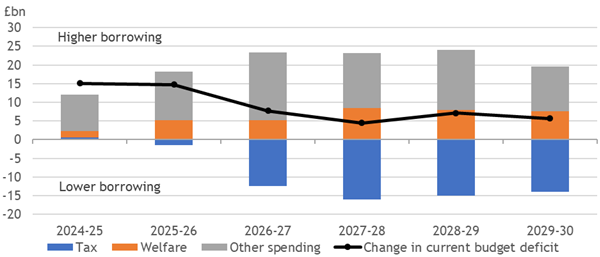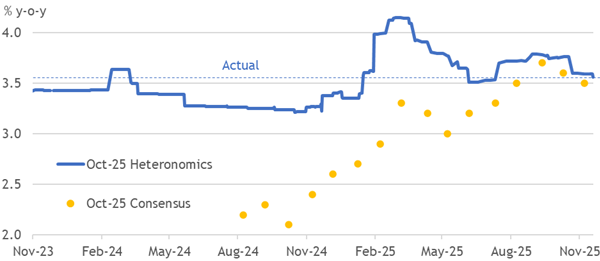This weekly newsletter pulls together summaries of the top ten most-read Insights across Macro and Cross Asset Strategy on Smartkarma.
Receive this weekly newsletter keeping 45k+ investors in the loop

1. UK: Some Workshy Start Looking
- A broadly softer labour market report could easily be used to overstate the fundamental significance. Unemployment’s rise was expected and only 0.2pp on the year.
- Employment is growing and redundancies are low, but when the inactive look for work, long-term unemployment rises. Yet the workshy will struggle to compete for jobs.
- Wage growth slowed despite a 0.5% m-o-m impulse. Costs are rising excessively fast, so the BoE still doesn’t have space to keep easing, and we expect no more rate cuts.
2. UK: Retreating To Trend Again
- Residual seasonality shocked the consensus again, this time on the downside, as the spurious surge is replaced with stagnation for the rest of the year in our view.
- The 0.3% m-o-m decline dragged GDP back toward its trend, wiping out the highly supportive statistical carryover effect for Q2, which we now forecast at 0.1% q-o-q.
- BoE forecasts are on track, allowing the MPC’s bias to slow easing to materialise with a pause. We expect cuts to keep being rolled later, with no more delivered in this cycle.
3. US Consumer Pricing Still Ignores Tariffs
- Another downside surprise in headline US inflation reflected the lack of pass-through from tariff increases, with headline and core rates of only 0.1% m-o-m in May.
- Commodities, less food, energy and car prices stalled as airfares and apparel fell again. But services (ex-shelter) inflation stayed too high to be consistent with the target.
- Low headline rates raise dovish political pressure and the risk of a cut, but the tight labour market should encourage the Fed to keep rolling potential cuts later.
4. HEW: Geopolitics Blow Hot And Warm
- Israel’s attack on Iran squeezes supply in an unwelcome shock that is harder for central bankers to look through post-pandemic. Warming US-China relations had less impact.
- Avoidance measures have helped mitigate the tariff shock so far, with US CPI holding steady. The importance of recent disappointing UK demand data is easy to overstate.
- The BoE is set to hold rates, probably with two dovish dissents and no commitment to August. UK inflation should slow with airfares normalising and a vehicle tax correction.
5. Why “Sell America” Isn’t Equity Bearish
- We have been fairly cautious in our U.S. equity outlook in these pages, but that doesn’t mean we are equity bearish.
- We are embracing the “Sell America” trade because of a combination of deteriorating U.S. fiscal position and the trade war policy pivot that’s contributing to falling confidence in USD assets.
- The key risk to our “Sell America” thesis is whether the U.S. can sustain its technology dominance in the next investment cycle.
6. US Treasuries: YOU BREAK IT YOU BOUGHT IT!
- The US Administration is undermining foreign demand for dollar assets at the same time, supply for US treasury debt is rapidly expanding.
- The Fed is constrained from lowering the Fed Funds rate due to rising yields in the long end of the treasury market.
- The long end of the US Treasury market is feeling the effects of Trump’s tariff policies. The US equity market will follow as risk premiums rise.
7. Asian Equities: Southbound Flows Turning to Dividends and Beaten Down Sectors
- In May, onshore Chinese investors bought US$5.85bn of HK-listed stocks, down sharply from the $19-21 bn net buying range of the past three months. The favorite stocks also changed sharply.
- The hitherto Southbound favorites, Tencent, Alibaba and Xiaomi were sold down. Onshore investors’ current favorites seem to be the high dividend yield stocks, particularly China Mobile, CNOOC, China Construction Bank.
- Competitive pressures crashed food delivery and EV share prices. But Southbound investors seem to see these share price drawdowns as buying opportunities. Meituan, Li Auto were bought in significant measure.
8. Walker’s Weekly: Dr. Jim’s Summary of Key Global Macro Developments – 13 June 2025
India cuts interest rates as currency pressure eases, aiming to boost private investment without triggering inflation concerns.
China’s exports rise overall despite a sharp drop to the US, showing strength through trade diversification.
Regional trade flows shift sharply, with Taiwan and Vietnam surging ahead of potential tariffs, while uncertainty clouds second-half investment outlook.
9. Inflation Concerns Overdone
- For Trading Post a global recession has never been on the cards, nor a resurgence in inflation.
- If mainstream economists continue to raise alarms about a tariff induced inflation surge, it reflects a fundamental misunderstanding of how inflation works and what drives it.
- Current trends in broad money growth, credit cycles and monetary policy settings simply don’t support the prevailing inflation narrative.
10. Trade Avoidance Easing Shocks
- China’s crashing exports to the US partly reflect avoidance measures, including rerouting through other countries and marking down import prices to subsidiaries.
- Exports to the EU and UK are only trending slightly higher, making little difference to disinflation. ASEAN countries, and especially Vietnam, are seeing trade surge again.
- The US may clamp down on avoidance measures that have eased the shock so far. It could make a painful example of one to encourage concessions from all trade partners.


